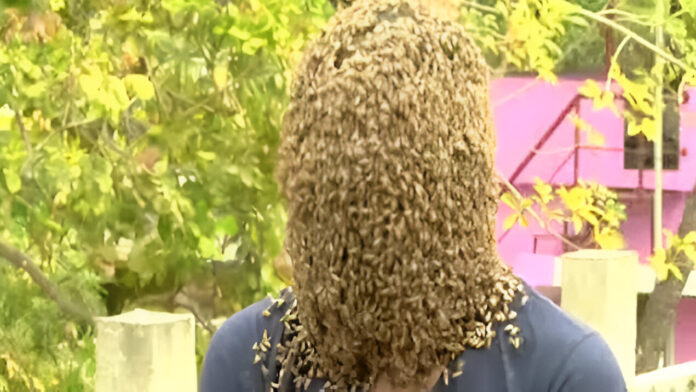Harare – South Africans are being alerted to a disturbing trend originating in Zimbabwe, where individuals are allegedly deploying swarms of bees to punish wrongdoers. Authorities and traditional healers are denouncing the practice as a fraudulent scheme preying on vulnerable members of the public, urging South Africans to be wary of the scam should it attempt to take root here.
The alleged con, widely reported in Zimbabwean media, involves sangomas (traditional healers), prophets, and even pastors who claim the ability to send bees after those who have wronged others, be it through theft, adultery, or property misappropriation. These claims, often amplified through online videos depicting individuals seemingly engulfed by swarms of bees, have reportedly led many desperate Zimbabweans to seek out these so-called "justice providers."
However, a recent investigation by a Zimbabwean news publication has revealed a darker side to this phenomenon, with numerous individuals lamenting being swindled out of their hard-earned money after seeking assistance from these self-proclaimed bee-wielding avengers. Victims claim they are lured in by the promise of supernatural retribution, only to find themselves poorer and no closer to resolving their problems.
One such victim, a resident of Sunway City in Ruwa, just outside Harare in Zimbabwe, alleges he was charged a staggering US$400 (about R7350) by a Harare-based who claimed to be able to dispatch bees to identify the culprit behind a theft at his workplace. Ironically, the man himself was a suspect in the crime, and hoped the bees would exonerate him.

"I went to this sangoma who claims to send bees, but nothing came of it, and I was arrested in connection with the theft I was being accused of," he lamented. "My money was lost. All of this is a scam; these bees are somehow manipulated to gather on a person."
Numerous other individuals in Zimbabwe, speaking to the news crew on condition of anonymity due to fears for their safety, shared similar stories of being defrauded by those claiming to possess the power to control bees. These accounts paint a picture of a calculated scheme that exploits people's desperation and belief in the supernatural.
The South African Traditional Healers Organisation (THO) has issued a statement urging caution, acknowledging the potential for such scams to spread across borders. "While these reports are currently focused on Zimbabwe, we must remain vigilant and ensure that our communities are aware of these fraudulent practices," said a THO spokesperson. "We urge South Africans to be extremely cautious of anyone claiming to have such powers, and to report any suspicious activity to the authorities."
Adding his voice to the chorus of condemnation, Mr. Chaipa Mutandwa (55), the national programmes director of the Beekeepers Association of Zimbabwe, vehemently refuted the notion that bees can be controlled and directed to attack specific individuals.
"If you take a queen bee and confine it to a specific location, all the other bees will gather there," Mr. Mutandwa explained. "There are also traditional medicines that can be added to water, causing the bees to become disoriented and allowing them to be manipulated before they recover. There is a lot of falsehood in this matter."
Mr. Mutandwa's explanation suggests that the bees seen swarming around individuals in these videos are likely being manipulated through the use of a queen bee or chemical substances, rather than being supernaturally controlled.
Mr. George Kandiero (50), the head of the Zimbabwe National Traditional Healers Association (Zinatha), echoed this sentiment, branding the use of bees purportedly sent by n'angas and prophets as a complete fabrication and a blatant scam.
"This is a scam being perpetrated by these individuals," Mr. Kandiero stated emphatically. "Our organisation, Zinatha, does not condone such practices, and the documents being used by these individuals claiming to be from Zinatha are fake. People should refrain from seeking help from these individuals because those you see covered in bees are being paid. These bees are treated with something to prevent them from stinging these individuals."
Mr. Kandiero also warned that these fraudsters are preying on vulnerable individuals who are drawn in by the spectacle of individuals seemingly engulfed by bees in online videos.
"If bees could truly arrest people, the police would simply use bees to apprehend criminals," he quipped. "There are many con artists, so people should be wary of those who claim to be sangomas, prophets, or fake pastors. Many of them pay people to stage these events to attract more clients, with the person pretending to be a witch or engaging in other nefarious activities for a fee."
The South African Police Service (SAPS) has been alerted to the potential for these scams to spread into South Africa and has urged the public to be vigilant. "We are aware of these reports from Zimbabwe and are urging South Africans to exercise caution," said a SAPS spokesperson. "If you are approached by anyone offering such services, please report it to your local police station immediately."

Follow Us on Twitter











